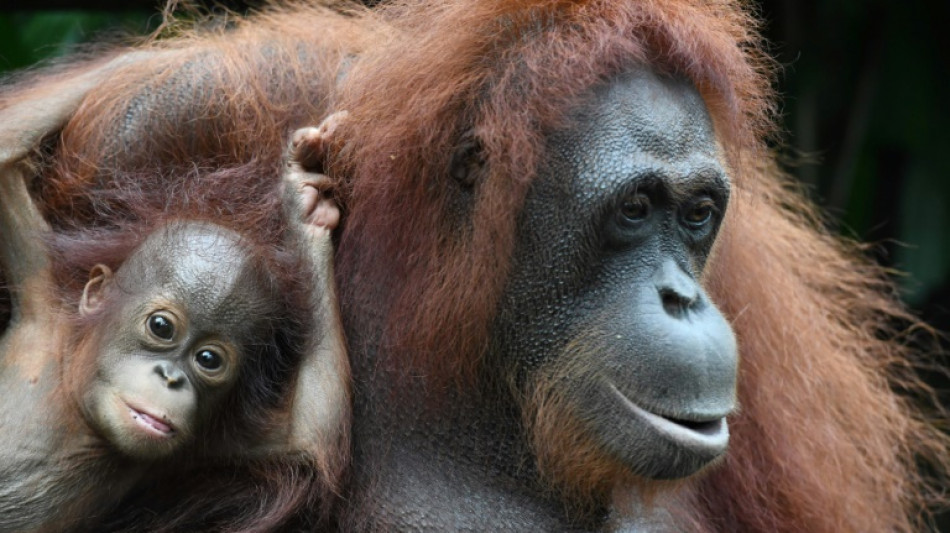
-
 US lost seven multi-million-dollar drones in Yemen area since March
US lost seven multi-million-dollar drones in Yemen area since March
-
Bucks blow as Lillard suffers torn Achilles: team

-
 Putin orders three-day truce amid new US warnings
Putin orders three-day truce amid new US warnings
-
Real Madrid's Ancelotti agrees Brazil deal - reports

-
 ChatGPT adds shopping help, intensifying Google rivalry
ChatGPT adds shopping help, intensifying Google rivalry
-
Global stocks mixed amid trade hopes as markets await tech earnings

-
 Commanders heading back to D.C. after inking $3.7 bln stadium deal
Commanders heading back to D.C. after inking $3.7 bln stadium deal
-
US warplane falls off aircraft carrier into Red Sea

-
 Feisty Arteta urges Arsenal fans to 'bring boots' to PSG Champions League clash
Feisty Arteta urges Arsenal fans to 'bring boots' to PSG Champions League clash
-
Bucks blow as Lillard suffers ruptured Achilles: reports

-
 No power, no phone, no transport -- Spain in a panic
No power, no phone, no transport -- Spain in a panic
-
US warplane went overboard into Red Sea: Navy

-
 'Like a dream' as IPL's 14-year-old Suryavanshi becomes youngest to hit T20 ton
'Like a dream' as IPL's 14-year-old Suryavanshi becomes youngest to hit T20 ton
-
Luis Enrique says PSG have improved since October Arsenal loss

-
 UN food, refugee agencies warn of huge cuts after funding losses
UN food, refugee agencies warn of huge cuts after funding losses
-
Trump trade war dominates BRICS meeting in Brazil

-
 Rashford expected to miss rest of Aston Villa season
Rashford expected to miss rest of Aston Villa season
-
IPL's 14-year-old Suryavanshi youngest to hit T20 ton as Rajasthan rule

-
 Halle Berry, Jeremy Strong to join Cannes film festival jury: organisers
Halle Berry, Jeremy Strong to join Cannes film festival jury: organisers
-
Klopp congratulates Liverpool on Premier League triumph

-
 Violence-weary Trinidadians vote in general election
Violence-weary Trinidadians vote in general election
-
Abuse scandal in focus in search for new pope

-
 Prince William and Kate mark wedding anniversary in Scotland
Prince William and Kate mark wedding anniversary in Scotland
-
Amazon set for launch of Starlink-rival satellites

-
 London mayor Sadiq Khan targets Olympic history for city
London mayor Sadiq Khan targets Olympic history for city
-
Stock markets diverge amid trade hopes, ahead of earnings

-
 Canada votes as Trump renews US takeover push
Canada votes as Trump renews US takeover push
-
Massive blackout hits all of Spain and Portugal

-
 Conclave starts May 7, cardinals say new pope must tackle abuse
Conclave starts May 7, cardinals say new pope must tackle abuse
-
BRICS ministers meet in Brazil over Trump trade policies

-
 Trump escalates immigration crackdown to mark 100 days
Trump escalates immigration crackdown to mark 100 days
-
Outkast, White Stripes, Cyndi Lauper among Rock Hall inductees

-
 Putin orders three-day truce in May but Ukraine asks 'Why wait?'
Putin orders three-day truce in May but Ukraine asks 'Why wait?'
-
Eubank Jr discharged from hospital following boxing grudge match

-
 China deploys army of fake NGOs at UN to intimidate critics: media probe
China deploys army of fake NGOs at UN to intimidate critics: media probe
-
Empty shelves? US Treasury secretary not concerned 'at present'

-
 Slot told Liverpool they could win the league at season start: Konate
Slot told Liverpool they could win the league at season start: Konate
-
Spain brought to a halt by huge blackout

-
 Stock markets mostly higher amid trade talk hopes
Stock markets mostly higher amid trade talk hopes
-
Conclave starts May 7, with cardinals saying new pope must tackle abuse

-
 Massive blackout hits Spain and Portugal
Massive blackout hits Spain and Portugal
-
Ruediger 'must show respect to others' says Germany boss Voeller

-
 As Canada votes, Trump pushes US takeover plan
As Canada votes, Trump pushes US takeover plan
-
Ten on trial in Paris over 2016 gunpoint robbery of Kim Kardashian

-
 African players in Europe: Salah scores, takes selfies as Reds seal title
African players in Europe: Salah scores, takes selfies as Reds seal title
-
Bangladesh spinner Taijul's 5 wickets trigger Zimbabwe collapse in 2nd Test

-
 French mosque murder suspect, 21, surrenders in Italy
French mosque murder suspect, 21, surrenders in Italy
-
Mayor Khan keen for London to make Olympics history

-
 Iranian president visits Azerbaijan as ties warm
Iranian president visits Azerbaijan as ties warm
-
What we know ahead of the conclave


Old joke: Apes also like to tease, meaning trait could be ancient
A boisterous young chimpanzee slaps an adult in his family on the back, then scampers away and looks back to see the response to his cheekiness.
Nothing yet, so the young chimp Azibo rolls back and dishes out another slap, this time provoking a reaction: the distracted adult waves a half-hearted swipe in his direction, shooing the troublesome youth away -- though not for long.
This scene recorded at Leipzig Zoo in Germany is just one of many analysed by scientists to show that great apes engage in playful teasing in a similar way to young human children.
Because all four species of great ape were recorded teasing each other, the "cognitive prerequisites for joking" probably evolved in a shared ancestor millions of years ago, the scientists said in a new study on Wednesday.
The researchers catalogued a wide range of classic japery. One ape would offer another an object, only to withdraw it at the last second. Or they would prevent their mark from grabbing something they want. Other tricksters simply did the opposite of what they were told. Some just liked to poke.
Much of this behaviour is common in human children, starting from around eight months for the most precocious.
Somewhere between normal play and aggression, playful teasing involves anticipating the response of others as well as enjoying going against their expectations, according to the study in the journal Proceedings of the Royal Society B.
Lead author Isabelle Laumer told AFP that the researchers were surprised this rambunctious teasing "rarely resulted in any aggressive behaviour".
The great primatologist Jane Goodall had previously observed that young chimpanzees "sometimes disturbed older animals when they were sleeping by jumping on them or playfully biting them, or pulling their hair," Laumer said.
"The adults also reacted to this quite calmly," added Laumer, a cognitive biologist and primatologist at Germany's Max Planck Institute of Animal Behavior.
- Aping around -
The team, which included researchers from the University of California, Los Angeles, analysed 75 hours of video of chimpanzees, bonobos, gorillas and orangutans getting up to hijinks in zoos.
Focusing on one youth of each species, the researchers identified 18 different teasing behaviours.
Unsurprisingly, chimpanzees were up to the most funny business. They liked slapping a dozing adult or just generally getting in the way. Orangutans showed a proficiency at hair pulling. Gorillas were fans of that most traditional of provocations: the shove.
As demonstrated by Azibo, most of the interactions involved a youth starting to tease an adult, then repeating the gesture until they got a reaction.
In one quarter of the interactions, the initial target turned the tables on the prankster, teasing them right back.
That could devolve into more traditional play, in which the apes wrestled, chased, mock-bit or tickled each other.
Such play takes two, but playful teasing has to be asymmetrical -- one has to target another, the researchers emphasised.
The cognitive ability to engage in such joking must have been present in the common ancestor of humans and all modern primates at least 13 million years ago, they said.
But beyond the laughs, what is the purpose of this incessant teasing among apes?
Laumer declined to speculate.
But she said that for human children, such teasing helps "test social boundaries," creating mutual enjoyment and therefore potentially strengthening the relationship between the prankster and the butt of their joke.
C.Garcia--AMWN


